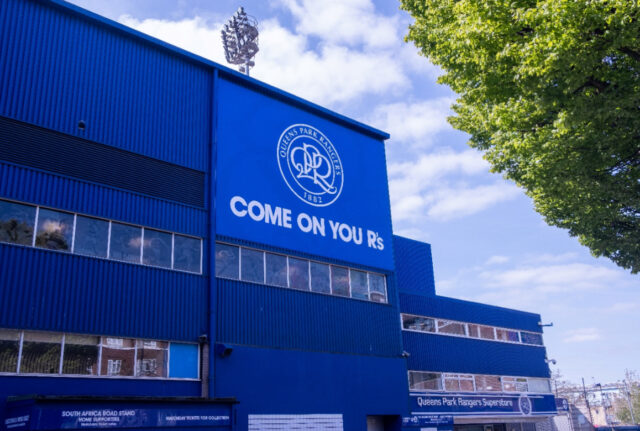As the spring sun sets later than usual across West London, Queens Park Rangers find themselves drifting through yet another season of quiet mediocrity. The 2024/25 campaign marks a sombre anniversary for the Hoops – a full decade since their relegation from the Premier League’s promised land.
Now entrenched as the Championship’s longest-serving team, QPR’s 16th place standing tells a story of a club suspended between faded memories and uncertain horizons.
The blue and white faithful who gather at Loftus Road have watched their dreams diminish into routine, as the team appears closer to the gravitational pull of League One than ascending toward the top flight’s brightness.
Under Marti Cifuentes, who arrived midway through last season as the latest in a carousel of managerial appointments, QPR exist in football’s liminal space – neither rising nor falling, just existing in a state that has shocked Championship relegation odds with their perpetual ability to survive without truly living.
How did a club once synonymous with Premier League ambition become stranded in this decade-long purgatory? From Adel Taarabt, Kyle Walker, and countless others to false dawn after false dawn. The answer lies in a chronicle of mismanagement, false dawns, and lessons painfully learned.
Premier League struggles
Queens Park Rangers approached the 2014/15 Premier League season armed with ambition and a swollen wage bill. Yet the same spectres that haunted their previous top-flight adventure returned with cruel familiarity: recruitment lacking coherence, a squad without unity, and planning that prioritisedimmediate gratification over sustainable growth.
Resources were squandered on ageing stars and players with depreciating value. The squad resembled a collection of individuals rather than a cohesive unit.
When Harry Redknapp walked away in February, caretaker Chris Ramsey inherited a sinking ship. The Rs finished bottom with a mere 30 points, their relegation punctuated by a devastating £40 million Financial Fair Play fine that would cast a long shadow over their recovery.
Losing key players
The aftermath of relegation became a slow dissolution of possibility. Steven Caulker, once seen as the future cornerstone of their defence, drifted away on loan journeys to Southampton and Liverpool. Joey Barton, whose voice had been the heartbeat of their midfield, departed for Burnley,where he would taste the promotion QPR craved.
Charlie Austin—their talisman who had somehow conjured 18 Premier League goals from a relegated side—remained only until January 2016 before Southampton claimed him. His goals had been a veil masking deeper fractures, and with his departure, those cracks widened irreparably.
The technically gifted Leroy Fer and the explosive Matt Phillips similarly represented fleeting hopes—Premier League quality temporarily trapped in Championship circumstances. By 2016, they too had departed, leaving QPR to rebuild not just a squad but an entire identity.
A decade adrift: The long Championship winter
What followed relegation was not the expected swift return but a gradual acceptance of new circumstances. QPR’s decade in the Championship reads like a cautionary tale of football’s unforgiving nature.
The financial constraints were immediate and severe. As parachute payments evaporated and the FFP fine loomed large, recruitment became an exercise in compromise rather than ambition. The revolving door of managers – from Jimmy Floyd Hasselbaink to Ian Holloway, Steve McClaren to Mark Warburton – created a perpetual state of transition, each new philosophy erasing the foundations laid by its predecessor.
While clubs like Brentford and Luton Town built clear identities and recruitment models that propelled them to the Premier League, QPR drifted between competing visions – never fully committing to youth development nor effectively pursuing immediate promotion in the Championship odds.
The brightest talents that emerged from this uncertainty – Ebere Eze and Ilias Chair among them – often departed to balance precarious books.
The narratives of near-misses gradually gave way to seasons of mere survival. Between 2015 and 2024, QPR’s trajectory trended downward; early promotion pushes fuelled by parachute payments yielded mid-table comfort, which eventually deteriorated into relegation battles.
Cifuentes and the road ahead
Cifuentes now stands as the latest figure tasked with navigating QPR’s uncertain future. The Spanish tactician represents a different approach – methodical, process-oriented, focused on building sustainable patterns of play rather than quick fixes. His arrival signals perhaps a recognition that the club’s renewal must be fundamental rather than cosmetic.
For QPR to escape their decade-long Championship residence, they must embrace clarity of purpose. A coherent recruitment strategy built around youth development and intelligent market operations must replace the scattergun approach of years past. Financial stability and competitive ambition must be balanced rather than opposed.
The path back to football’s elite remains arduous, but in acknowledging the mistakes that defined their lost decade, Queens Park Rangers might yet find their way home. Until then, the faithful at Loftus Road will continue to gather, carrying memories of better days and hope for brighter tomorrows.




